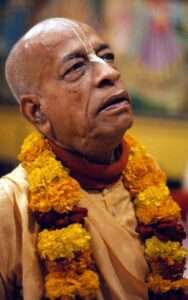 Man is imperfect
Man is imperfect
The limitation of reaching veritable and conclusive truths is caused by human imperfection.
On October 6, 1969, our Acarya (we use this Sanskrit word in the sense of “best source of explanation of knowledge”) Srila Bhaktivedanta Swami Prabhupada gave a speech to the Conway Hall in London, England. This speech then became the introduction of one of his books, Sri Isopanisad.
Let’s hear what Srila Prabhupada says about human imperfection:
“In the conditioned state, our knowledge is subjected to many deficiencies. The difference between a conditioned soul and a liberated soul is that the conditioned soul has four kinds of defects. The first defect is that he must commit mistakes. For example, in our country, Mahatma Gandhi was considered to be a very great personality, but he committed many mistakes. Even at the last stage of his life, his assistant warned, “Mahatma Gandhi, don’t go to the New Delhi meeting. I have some friends, and I have heard there is danger.” But he did not hear. He persisted in going and was killed. Even great personalities like Mahatma Gandhi, President Kennedy-there are so many of them-make mistakes. To err is human. This is one defect of the conditioned soul.
Another defect: to be illusioned. Illusion means to accept something which is not: māyā. Māyā means “what is not”. Everyone is accepting the body as the self. If I ask you what you are, you will say, “I am Mr. John; I am a rich man; I am this; I am that.” All these are bodily identifications. But you are not this body. This is illusion.
The third defect is the cheating propensity.
Everyone has the propensity to cheat others. Although a person is fool number one, he poses himself as very intelligent. Although it is already pointed out that he is in illusion and makes mistakes, he will theorize: “I think this is this, this is this.” But he does not even know his own position. He writes books of philosophy, although he is defective. That is his disease. That is cheating.
Lastly, our senses are imperfect. We are very proud of our eyes. Often, someone will challenge, “Can you show me God?” But do you have the eyes to see God? You will never see if you don’t have the eyes. If immediately the room becomes dark, you cannot even see your hands. So what power do you have to see? We cannot, therefore, expect knowledge (veda) with these imperfect senses. With all these deficiencies, in conditioned life we cannot give perfect knowledge to anyone. Nor are we ourselves perfect. Therefore we accept the Vedas as they are.”
This is a section of the book “Brilliant As the Sun”(English).
To buy the complete book, click here



Leave a Reply